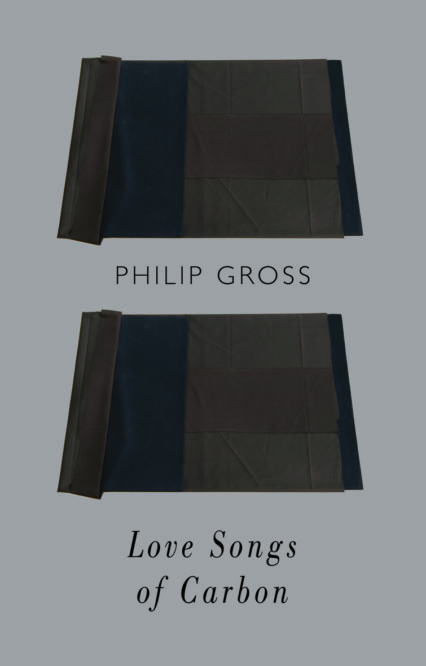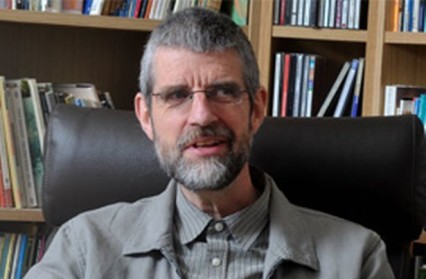Helen Calcutt casts a critical eye over Philip Gross’s collection of poetry Love Songs of Carbon.
It is not often you come across a poetry collection and think ‘not one word has been wasted.’ You can’t get on with every poem. You can even dislike a few. But with Philip Gross’s Love Songs of Carbon the reader comes away assured they haven’t been cheated.
So often a collection rides on the wave of twenty or so good poems, with a number of stragglers that should never have been included. Not so with this collection. It’s the same as when I read Paul Henry, or Mario Petrucci, or Keith Douglas – or even Shakespeare. Every mark in the poem has its place. The lines sing to each other internally, balanced beautifully, even if at first you don’t fully recognise or understand the sentiment.
The central poem, it can be argued, is ‘Fire Balloon Heart’. The first line: ‘Still too winter a night to be lingering but/off track, beyond the shrubbery, these two are struggling’ – gives an immediate sense that something ready to inspire is working its way into the air. It’s the run of the line, and the feel for it, that seduces you. One of this collection’s primary qualities is that it is seductive.
But it’s what the poet is saying too, and how he’s saying it, that gives the poem its magnitude. Here is Gross at his most naked, in finite work, that is at once relaxed and unlaboured as it is insistent. The message is clear – ‘we are fragile, we are living’, but it’s the quiet fury and the power behind the words (the same soft, powerful luminosity of a fire balloon) that gives the reader an indication to the direction of Gross’s creative compass. Where he has arrived in his work, and how fully he is able to tackle and tame it into breeze blocks of pure verse:
‘It’s a read glowing heart. Aah…
….though apt to trip and flutter – yours
with (the doctor looks up
from her stethoscope trance)
its murmur’.
‘Listen’, it says, ‘Steady now./Take care.’ These final lines are very telling. They reveal much about the way this poem, like so many others in the collection, have come into being. Some of the more subtle poems could be considered harmless in the negative sense – but I think them more powerful than those that ream and flurry. The pressure in ‘Fire Balloon…’ is immense – you only have to read it aloud to feel its quick violence. Like so many others (but coming to a head here) this is one of the most alert, confident, exquisite poems I’ve read from a widely published modern poet in a long time.
I tend to bristle at the thought of overly experimental work. I feel that a lot of it is done entirely for the sake, rather than the soul, and I find myself distracted by this before I’ve even started to read. It’s entirely subjective that I struggle with poems that don pathways or different fonts or bullet points. And so with Gross I have the same problem. Though this is the gift of critical writing. Forced to bury my head into Love Songs of Carbon I found that the initial bleak, un-subsiding current of the language carried me through:
- This figures on our flat-earth maps and minds as a circle. An
ever-widening, astonished O….
- ….or an expanding empire. Outposts, farther frontiers…’
(Towards a General Theory of String,)
There is a consistent balance in Gross’s work, sucking the reader into the often complex linguistic magic while offering a very clear picture. Offering readers the chance to appreciate the developmental feel to the raw material. ‘A Pump in Africa’ has become one of my go-to poems. It’s so pressurised – with much control. It carries huge amounts of energy yet there are no fireworks – all very steady, easy-easy, like a drug, pumped into the system with just the right amount of pressure through the simultaneous output and input, where skin and needle meet:
‘Here’s water as the Human eye
can’t see it. Maybe God’s
eye or a fly’s
the mirror ball
of timelessness’

The language is never overly intense, yet extremely binding. The energy of the words are tempered within their structures. We have tight verse formats – it doesn’t matter about the length of the line – almost restricting the movement of the work, but in the hands of an astute poet, this restriction is more a correct channeling of the creative properties, and therefore vital to the poem’s success. As Michael Symmons Roberts and Moniza Alvi outlined, it’s ‘the absolute poise of the lines’ that cut and carve through the ‘knotted difficulty’ of the language, that allow the poem’s minerals to seep through. Though knotted isn’t a word I would use. The language isn’t twisted. It bleeds, like word-music in its purest form. What the poet does with the structure, is give the initial surge just the right amount of pressure to ease and inflict movement to its expansive flow. What we’re left with is a living chord. It swells, retracts, rises – all the beauty of a living thing fully able to gestate and breathe, but never bloat or become grossly oversized:
‘There, you caught it: the wind, that
something which is nothing
but its moving and
the ways the world is swayed around it’
(Limited Edition)
These poems are the mark of a deeply mature writer who understands the freedoms within restraint. This has nothing to do with age either. It’s the inner connectedness, the time spent conscripted to the nature of how a poem wants to come through, and how best to get it there, that gets a writer to this stage. And this is what I admire about Gross – he has such a powerfully imaginative connection with language, he’s dedicated his writing life to mastering true understanding for the heightened potential of overly complex messages, and making them conceivable. He doesn’t purify or condense (I think the form of this particular run of language is already purified); he contains. Nothing from the finished product seems added or taken away; it feels imagined in the instant of reading. And in this it also has the old magic.
This is where poetry should be going. This is loud, controversial poetry that challenges us to read again. It’s not obscure. I read this somewhere and completely disagree. I think the unfortunate misjudgment here is the differentiation between obscurity within a piece of work, and the work asking you to see the world differently –
‘Leave your still-life bowl of fruit
a little longer. Life, still. The nectarine
hints, one last time, at puberty.’
(Mould Music)
Poems like these project the world through a very particular lens. And I’m grateful a writer like Gross continues to be published, and have his lens exposed to a large population of the reading world. These are poems that are traditionalist in nature, but modern in verse. They radiate originality, combining contemporary sentiments and themes with a somewhat provocative linguistic tone. With Gross, and his 18th collection, it seems the balance has been found, and the bar set.
To find out more about the works of Philip Gross visit his website.
Love Songs of Carbon is available from Bloodaxe Books.
Helen Calcutt is a poet, dancer, choreographer and contributor to Wales Arts Review.











